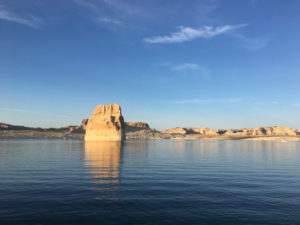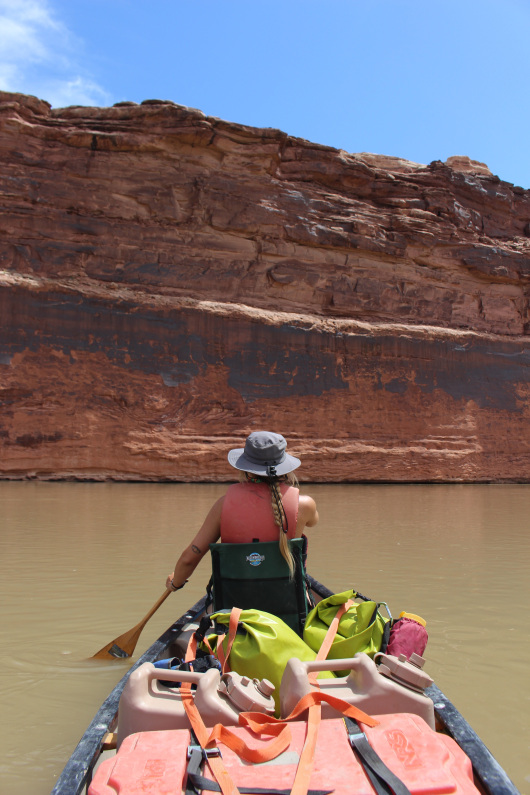 I sit on the shore of Lake Powell. My wristwatch reads 6:16 pm, the sun is creeping below the horizon, and the warmth of the day is still tickling my skin. I stare across the glassy blue water to the sandstone cliffs on the other side of the lake.
I sit on the shore of Lake Powell. My wristwatch reads 6:16 pm, the sun is creeping below the horizon, and the warmth of the day is still tickling my skin. I stare across the glassy blue water to the sandstone cliffs on the other side of the lake.
Below the peaceful surface lies a deep canyon, widely unknown to the many tourists that camp along the lake’s edge and speed across it in motor boats. But I, along with my groupmates, rest along its gritty, slickrock rim and imagine the vast canyon that once lay before us.
How deep did this submerged canyon once plummet? How much sediment now fills in the many cracks and alcoves the elements took such care and time creating?
Gentle ripples lapping at the water’s edge were once gentle gusts of wind. Fish swimming beneath the surface mimic birds soaring between canyon walls.
Gazing across the lake at a butte illuminated by the evening light, I wonder how it feels to spend your whole life dancing with the clouds, watching over the flora and fauna below, and suddenly being suffocated by the rising Colorado River, your oldest companion.
While the beauty of this refreshing water is undeniable, the underlying feeling of wrongness is unquestionable.
There was a time when the Colorado River flowed freely down the heart of Glen Canyon, whose wonders compare to that of the Grand Canyon. But that abruptly changed with the construction of the Glen Canyon Dam. Completed in 1966, the dam drowned this relatively untouched wilderness with the powerful water of the Colorado River, transforming it into the Lake Powell of today. This traded the intrinsic values offered by Glen Canyon for the instrumental value offered by the Colorado River, utilized by the Glen Canyon Dam. This change appeals to some but is viewed as a tragedy in the eyes of many others.
A landscape, such as Glen Canyon, or a resource, such as the Colorado River, holds intrinsic value in the guidance it offers to humanity from its very existence and instrumental value in its measurable, useful benefits. In his essay In the Black Chamber, Paul Kingsnorth states that we need to believe and confidently state that “nature has some intrinsic, inherent value beyond the instrumental” to protect and leave it undefiled.
Instrumentally, the Colorado River, harnessed by the Glen Canyon Dam, now offers hydropower, flood control, tourism, recreation, and a large water reservoir in the water-scarce desert. But many would argue that the intrinsic benefits of Glen Canyon offered irreplaceable values and significance from its ancient indigenous history and glowing sandstone canyons, now altered forever.
I ponder this with the mind of a biophiliac, one who has a passion for loving, interacting, and protecting other forms of life and the natural world, ultimately supporting the lost intrinsic values found in Glen Canyon now lying deep beneath the rippling surface of Lake Powell. How do we stress the importance of intrinsic values while living in a world of biophobics, those with disregard and discomfort to the natural world, who are inclined to focus on quantifiable instrumental values?
The writings of Kathleen Dean Moore state that “there is worth in these products of time and rock and water far beyond their usefulness to human purposes.” Might there be a balance of intrinsic and instrumental values, biophilic and biophobic mindsets, that doesn’t compromise the future integrity of wonderous landscapes, and the ultimate connector of all living things, water?
I now sit and paddle down the Green River. Walls of varnish-painted sandstone stand proud on either side of me. Willow trees sway to the rhythm of the breeze on the banks. A Blue Heron, still as a statue, watches as I float by. The radiation of the sun from above and bubble of water below soothe my soul.
I cannot measure this moment or put a price on this place and the peace it brings.
I begin to understand the magnitude of loss felt by those who experienced a similar intrinsic value of floating down the Colorado River in Glen Canyon prior to its incarceration by the Glen Canyon Dam. Were the free-flowing Green River to suffer the same fate, the tragedy would be unfathomable and a special part of my heart would drown with it.
